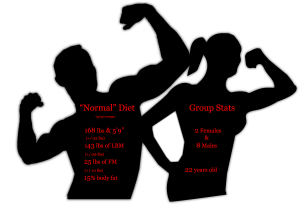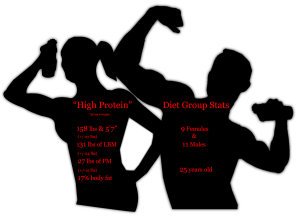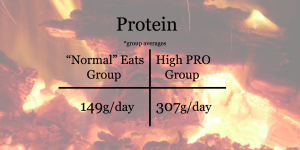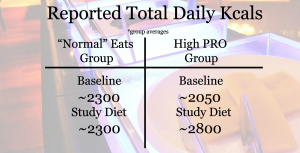What happens when we take protein to the limit?
As most weight lifters know, protein is the king of the macronutrients.
A fairly common view among lifters is that they should get all the proteins all the days in order to jack up the muscles, aid in recovery, and build up the gunz. On the other hand, another common view is that so much protein will hurt you and your kidneys. What are lifters and general fitness enthusiasts to do with these competing views?
Unlike some of the previous papers that I have clubbed here, this paper is fairly recent. It was published in 2014. This study was led by the notable Dr. Antonio and is titled, The effects of consuming a high protein diet (4.4 g/kg/d) on body composition in resistance-trained individuals.
The official USA recommended daily allowance (RDA) for protein is ~56 g/day. That’s from the recommendation of 0.66 g/kg/day. For those used to thinking in terms of lbs, that’s 0.3 g/lb/day. As the authors of today’s paper cite, studies have suggested that physically active people should consume higher amounts of protein. Further, the average protein intake for US adults is higher than the RDA.
With everyone consuming so much protein, why the lack of a kidney epidemic? Further, studies on physically active folks with increased protein intake have never reported harmful side effects. I have even discussed one such study here. Coupling that with studies that have shown protein intake aids in muscle recovery, the researchers asked what are the effects of an ultra-high protein diet?
Does an ultra-high protein diet fry the kidneys? Does it blow up the muscles? Let’s find out!
Methods
This study lasted 8 weeks and had a mix of male and female participants. All of them were “trained”, meaning that they had been lifting weights regularly for a long time. There were 2 groups. The first continued their “normal” diet. The second group was instructed to eat 4.4 grams of protein per kg of body weight a day. Both groups were instructed to continue their training habits during the study. All of the participants logged their training and diet info on the MyFitnessPal app or kept a paper journal.
Below are the starting descriptive stats for each group. As always, they’re group averages and rounded to the nearest whole number for the ease of viewing.
All of the participants had pre/post measurements taken of their scale weight and overall body composition.
Results
As always, let’s cut to the chase.
Neither group had any significant difference from their baseline measurements!
Ok, what about the protein? Below are the reported daily averages consumed.
How much food did they consume in general? Below are the reported daily average kcals.
The researchers purposely assigned twice as many participants to the high protein (↑PRO) group, due to the expectation that there would be a high dropout rate. They were correct. Ten of the participants in that group dropped out of the study before it was completed. Three did not increase their protein consumption, 1 had stomach distress, and 6 did not give a reason for dropping out. There were no reports of kidney damage.
Implications / Thoughts
Unlike a previous post, these researchers did not report individual results. They also did not breakdown the results by sex. That was likely because there was a small number of females. Their results alone would not have provided any useful empirical information. The control group had only 2 females. That is no more than a case study! Useful information was not possible this time. I would have liked a breakdown by participant, though.
One could say that the inclusion of females could have washed out any results, given the possibility of a different response to the ↑PRO or that their body weight/composition differences could have affected the stats. While possible, I note that the weight and body comp stats for the groups are no wider a range than a study with just one sex. If the sex differences were skewing the stats, I would have expected to see that and I did not.
The participants were asked to continue their usual training. That could have been a variety of exercises. Regardless, this study sought to find out the effects of high protein diets on physically active resistance-trained participants. These participants all lifted to some degree and they were randomly assigned to either group. Consequently, both groups should have an equal blend of training styles. The only variable that should have been changed and produced a result should have been the protein consumption.
On the topic of the protein consumption, the reported kcals consumed during the study are dramatically different between the groups. If the ↑PRO group did actually consume 800 additional kcals/day and not gain weight, FM, or LBM, then that is an impressive result. To explain part of that result, the researchers cite studies that have shown that protein increases metabolic rate. These participants used whey and casein powder to meet the protein goal. So, they likely did not consume additional non-protein kcals that could have contributed to weight gain. Trained individuals have also been shown to have a very different response to overfeeding and protein consumption than newbies. The researchers suggest that this population may be resistant to weight gain when dramatically overfeeding protein.
In Conclusion
This study is the first in the literature to report on extremely high protein consumption. Unlike what doomsayers would predict, no kidneys were fried in the making of this study. The recently released World Health Organization’s recommendations on meat consumption are focused on the types and components of protein-rich foods, rather than the RDA. Seasoned lifters should not worry about frying their kidneys or worse body composition from their high protein consumption.
If you have any questions about this study or anything I said, please feel free to leave a comment. I will get back to you and others may have insight to offer, too. If you have any questions or topic suggestions that you would like answered as a post, then please email me at robert@analyticfitness.com.
Don’t forget to like Analytic Fitness on Facebook, or follow me on Twitter or the other social medias!









No Responses